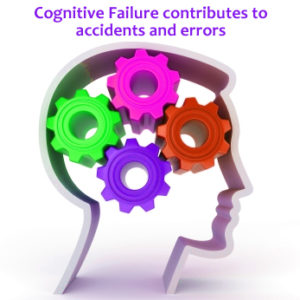 Cognitive failures are often known as action slips, brain burps, slips in attention – mistakes that a person should not normally make (Wallace & Vodanovich, 2003). These occur as a result of faulty processes in our brain such as a lapse in attention (failures in perception), memory (information retrieval), and motor function. Cognitive failures may be as simple as forgetting to lock the office door when heading home or as complex as an air traffic controller overlooking an inbound airplane. Some of which can be quite serious, as you can imagine.
Cognitive failures are often known as action slips, brain burps, slips in attention – mistakes that a person should not normally make (Wallace & Vodanovich, 2003). These occur as a result of faulty processes in our brain such as a lapse in attention (failures in perception), memory (information retrieval), and motor function. Cognitive failures may be as simple as forgetting to lock the office door when heading home or as complex as an air traffic controller overlooking an inbound airplane. Some of which can be quite serious, as you can imagine.
Cognitive failures commonly found at the worker level, may be as simple as forgetting important work-related rules or procedures, or ignoring an important communication request made by a co-worker. Little mistakes like these detract from effective job performance and can lead to serious accidents (Wallace & Chen, 2005).
As a person learns a new task, they may be prone to memory-related cognitive failure. The information they are learning may be new to them, which can be easily forgotten or confused with other information. At times, this may explain why accidents occur more frequently with newer employees. If the person is overly-familiar with a task, making it even more automatic or mundane can also lead to errors. People often complete the same tasks day-after-day, which results in autonomous motions, without thinking, and with little focus. This also gives a person time to invite distractions into their mind that could lead to accidents or errors, particularly if a sequence or pattern in work changes. A person who completes a task in robot-like fashion, could result in cognitive failures when new events arise, and that individual is not focused on the task. This creates a need to modify or change actions that have not been anticipated.
Finding a solution to cognitive failures is easier said than done. Simply stating, “pay attention” is the typical answer and solution, but “pay attention” to what and how? To lessen the occurrence of cognitive failures, and related accidents, multiple changes can be implemented which can help answer the “whats” and “hows”.
- In regard to extended shift work, “mini” breaks are found to be helpful in keeping the worker focused and on-task.
- To help new hires, employees need to be “coached-up” to follow rules, procedures, and protocols.
- Small group “time-outs” to discuss immediate concerns, risks, and changes without looking too far ahead is also very important.
- Leaders asking “what if” questions to help employees anticipate changes in work and related-risks is critical – but again, focus only on the immediate task, don’t speak too far ahead within the work path.
- Help your employees pay better attention though attention control training – having them realize that they need to constantly shift between channels in order to “pay attention” to the right things. Check out the four channels within my PACE Model to help your people “Dial into the Right Channel”.
Do yourself a big favor and begin to categorize your near-misses and accidents. If you are seeing underlying causes that relate to poor planning, lack of focus and distractions, or poor attention to one’s surroundings, then you have attentional problems that can be improved.
All of the above tips and techniques can help you lessen the impact of cognitive failures and the overload associated with cognitive error. It’s a never ending battle but we have more tools than ever to help workers stay safe and whole. Give me a call at 1-724-379-6439.
References
Wallace, J.C. & Chen, G. (2005). Development and validation of a work-specific measure of cognitive failure: Implications for occupational safety. Journal of Occupational and Organizational Psychology, 78, 615-632.
Wallace, J. C., & Vodanovich, S. J. (2003). Workplace safety performance: Conscientiousness, cognitive failure, and their interaction. Journal of Occupational Health Psychology, 8, 316-327.
